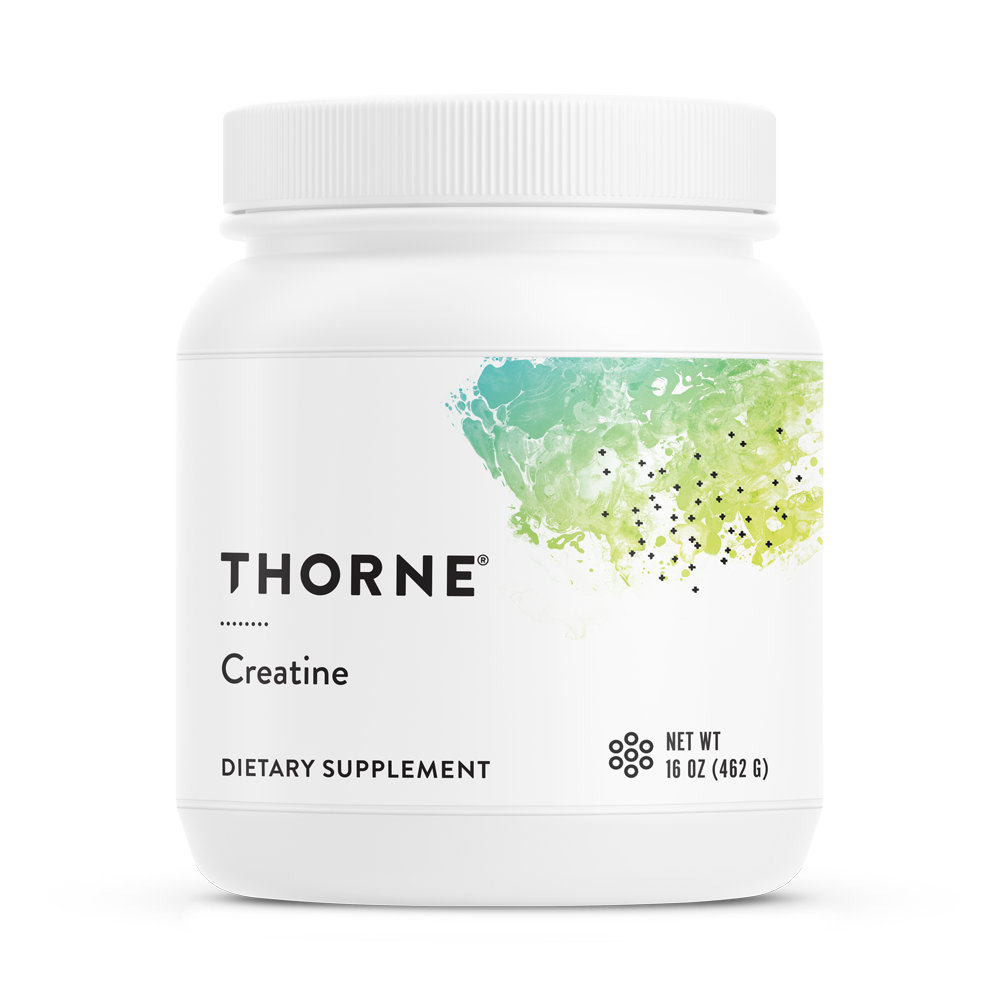Listen on: Apple Podcasts | Spotify
If you could only choose one supplement to build muscle (assuming you already use the Foundational Five), creatine monohydrate would have to be first on the list. Yet, it does much more than build muscle.
It offers a host of health benefits, from helping to deal with depression, slowing age-related muscle loss, and enhancing athletic performance.
If you’re not using it now, you could be missing out on one of the most potent (and affordable) health-promoting supplements on the planet.

Feel Better Fast. Guaranteed.
Energy+, EDGE, and MentaBiotics make up the Happy Juice supplement stack, with ingredients clinically proven to:
- decrease anxiousness scores by 55%
- decrease irritability scores by 60%
- decrease fatigue by 64%
- decrease anger 54%
- decrease tension by 45%
- decrease confusion by 43%
- decrease overall distress by 49%
- increase good bacteria by 70%
- decrease negative mood by 105%
- increase positive mood by 211%
What is Creatine?
Creatine is a non-protein amino acid, used in high-intensity muscle contraction and brain function. You store about 95% in muscle tissue and the rest in your brain and (in men) the testes.
Short-term, high-intensity exercise relies on the phosphagen system, also called the Adenosine Triphosphate-Phosphocreatine (ATP-PC) System.
As the name suggests, adenosine triphosphate contains three phosphate molecules. Breaking the bond between phosphate and adenosine leaves you with adenosine diphosphate (ADP) plus phosphate, and releases energy to power muscle contraction.
As your muscles demand energy, they deplete stores of ATP. To continue muscle contraction, you need to find a phosphate and add it to ADP, rebuilding ATP.
Creatine phosphate donates that phosphate.
By increasing your creatine monohydrate intake, you increase your stores of creatine phosphate, which helps you complete an extra rep or two, lift more weight, or carry out intense activity longer before fatiguing.
Your kidneys, liver, and pancreas produce about one gram per day from the amino acids arginine, glycine, and methionine.
The average non-vegetarian consumes another one to three grams per day through their diet. These amino acids are needed to synthesize creatine internally.
| Group | Avg. Creatine Stores (mmol/kg dry muscle) |
|---|---|
| Vegetarians | 90-110 mmol/kg |
| Avg. Meat-Eater | 120 mmol/kg |
| Upper Limit | 160 mmol/kg |
Meat, fish, and poultry are the primary dietary sources.
However, even if you eat a high-protein diet, you won’t eat enough meat to maximize stores in your muscles and brain. Supplementing raises storage levels by about 33%.
Creatine…
- Prevents depletion of ATP
- Stimulates protein synthesis
- Prevents protein breakdown
- Helps stabilize membranes
- Acts as an antioxidant, aiding in the reduction of reactive oxygen species (ROS)
Performance Benefits
Creatine is the most-used ergogenic aid on the planet. That’s not surprising since it’s so effective and safe.
The effects of creatine supplementation occur after the loading phase, which saturates muscle fiber stores. Supplementation typically improves high-intensity physical performance by 10-20%.
Performance benefits are more pronounced in men than in women, mainly due to their higher muscle mass. The following are well-supported performance benefits of creatine.
- Increased strength: Creatine draws fluid into muscle cells, improving muscle strength by increasing the muscle’s leverage around the joint. Since you can lift more weight, the additional stress on your muscles simulates further strength gains.
A 2003 meta-analysis showed that creatine supplementation increased one-rep max (1RM) by an average of 8%, and endurance strength (maximum reps at a given percentage of 1RM) by 14%.
- Increased work capacity: Creatine helps you complete more repetitions or use more weight before reaching momentary muscle fatigue by regenerating ATP. In the same way, it allows sprinters to sprint further before fatiguing, or athletes in intermittent sports like basketball or soccer to go all-out before slowing down.
- Enhanced glycogen repletion: Supplementing with creatine in combination with glucose restores glycogen better than consuming glucose alone. It may also extend the period before glycogen-dependent athletes reach a state of glycogen depletion.
- Reduced performance decrements from exhaustive exercise: High-volume training can eventually lead to overreaching, or overtraining. Research shows creatine helps you maintain higher-volume training longer, increasing the length of time you experience benefits before needing to take a break.
- Improved performance and hydration in high heat: Creatine causes a short-term increase in water retention, which is why most people experience significant gains in lean mass during the loading phase. The increased water helps dissipate heat, allowing people to train harder in higher-heat conditions.
- Faster recovery from training sessions: Creatine blunts the rise in inflammation following exercise. Supplementing also helps reduce muscle damage from training. Both may result in more rapid recovery from training sessions.
- Additional performance benefits: Research shows creatine supplementation may also:
- Reduce muscle tightness
- Reduce muscle strains or pulls
- Decrease risk of contact injuries
- Decrease risk of non-contact injuries
- Increase lean body mass
Read also: The 4 Best Muscle-Building Supplements.
Health Benefits
Though creatine is most well-known for its performance-enhancing effects, the impact on health and certain conditions could be even more important.
- Injury recovery: Creatine supplementation may reduce muscle loss in immobilized limbs, help maintain normal inflammation levels, and increase the rate of muscle growth once rehabilitation begins (I used it while recovering from a distal bicep tendon rupture).
In one study, individuals had their right legs casted for two weeks, followed by a 10-week rehab phase. The group using creatine experienced 10% greater muscle fiber growth and 25% greater improvements in strength.
- Nervous system protection: Creatine seems to protect the brain and spinal cord from injuries, including traumatic brain injury. It does not prevent injuries, but evidence indicates it can reduce damage by 36-50%. This benefit alone makes it a no-brainer for any athlete participating in contact sports or events that risk head or spinal injuries. Animal research shows brain function improves faster following neonatal brain damage.
- Enhanced cognitive function: Because the brain is the other tissue where you find creatine, it’s no surprise that supplementation may enhance cognitive function, especially in older adults or in those with sleep deprivation.
- Reduced symptoms of depression: In women and adolescents, creatine supplementation has reduced symptoms of depression.
In one study, those who supplemented with five grams of creatine in addition to their antidepressant medication responded to treatment twice as fast as the medication alone. It seems to enhance the efficacy of selective serotonin reuptake inhibitors (SSRIs).
- Supports normal insulin sensitivity: Supplementation increases GLUT4 levels in muscle cells, which is important for insulin sensitivity and healthy blood sugar. Doctors may find it helps support conditions such as diabetes or insulin resistance.
- Supports normal inflammation levels: Animal research shows it reduces tissue inflammation and may help conditions such as arthritis. This could also be part of the reason those with fibromyalgia may experience some relief when supplementing.
- Supports health in those with genetic creatine synthesis deficiency: Genetic mutations can reduce or prevent creatine production or transport. Without supplementation, these mutations create deficiencies that result in autism, epilepsy, gyrate atrophy, mental retardation, movement disorders, muscle myopathies, or speech delay. High-dose supplementation often reduces symptoms, provided it’s taken long-term.
- Delayed effects of aging: The human body ages from oxidation, inflammation, cognitive dysfunction, and loss of muscle tissue. It seems creatine positively impacts all of these issues, making it a valuable part of a nutrition plan for older adults.
- Additional health benefits: Research shows supplementation may provide benefits in conditions such as:
- Muscular dystrophy
- High cholesterol
- Pulmonary disease
Read also: How to Gain Muscle Without Gaining Fat.
How To Increase Creatine Stores
Your body makes a maximum of about 1 gram of creatine on its own. You consume another 1-3 grams per day through food, provided you eat meat.
The research shows you need at least another 5 grams per day long-term to saturate muscle stores, which is nearly impossible to do through food alone. You’d need to eat an additional 2.5 to 5 pounds of meat per day to ingest another 5 grams of creatine. That’s as much meat as a wild lion eats.
The majority of research on creatine is based on oral creatine supplementation.
To saturate your muscle stores, use creatine monohydrate. Creapure® is the gold-standard, which is a dry, white powder. It’s best to consume it shortly after mixing it in a beverage, as water eventually degrades it to creatinine.
Because it’s been around for so long, many companies have tried to create new forms of creatine, hoping to put a new marketing spin on it. They include:
- creatine citrate
- creatine serum
- creatine ethyl ester
- buffered creatine
- creatine nitrate
None of them have the scientific support that monohydrate does.
Read also: Nitric Oxide and Nitrates: Health and Performance Benefits.
Loading Phase and Maintenance Phase
The fastest way to see results from creatine supplementation is by following a loading phase. The loading phase also seems to be necessary to increase brain levels.
For seven days, take five grams, four times per day.
Don’t try a shortcut of 20 grams once per day. The research shows you’re unable to absorb or utilize such a large dose all at once.
After the loading phase, take a 5-gram dose once or twice per day.
If you stop taking it for a while, you’ll need to follow the loading phase again.
Doctors working with diseased populations may prescribe 10-30 grams per day long-term.
Some people are born with genetic mutations that prevent them from producing creatine, making supplementation an essential part of their daily routine.
Safety, Side Effects, and Adverse Events
It seems that myths and misinformation surround almost every effective nutritional supplement. As well-proven as creatine is, some myths still exist. With few exceptions, it is incredibly safe, well-tolerated, and associated with few adverse effects.
…contrary to unsubstantiated reports, the peer-reviewed literature demonstrates that there is no evidence that: 1) creatine supplementation increases the anecdotally reported incidence of musculoskeletal injuries, dehydration, muscle cramping, gastrointestinal upset, renal dysfunction, etc.; or that 2) long-term creatine supplementation results in any clinically significant side effects among athletes during training or competition for up to 3 years.
Buford TW, et al. International Society of Sports Nutrition position stand: creatine supplementation and exercise
A 2015 review of research showed in females, the use of creatine monohydrate had:
- no association to mortality
- no association to serious adverse events
- no evidence of negative effects on renal function, as measured by creatinine levels
- no association with adverse cardiovascular function
In college-level football players, supplementing with 5-10 grams per day for 21 months did not affect:
- Kidney function
- Muscle or liver enzymes
- Markers of muscle breakdown
- Electrolytes
- Blood lipids
- Urine volume
Like the myth about following a high-protein diet, you might have heard that creatine is hard on the kidneys. That is not the case unless someone has pre-existing kidney disease. In that case, it may be problematic, but it’s far from certain.
While some case studies have suggested that creatine causes renal dysfunction, most empirical studies in humans and animals indicate that it is more probable that creatine worsens pre-existing renal disease.
Patricia Allen, Creatine metabolism and psychiatric disorders: Does creatine supplementation have therapeutic value?
Most people experience weight gain during the loading phase, though that’s not necessarily a “side effect” unless you’re trying to make weight for a match. Fluid retention in the muscle cells increases body mass, but it’s a benefit for most people.
The most common concern is mild digestive discomfort in some people. If someone experiences digestive distress, it’s usually during the loading phase. The extra beverages consumed during the loading phase may contribute to the digestive distress as well.
A small amount of evidence suggests creatine may exacerbate asthma attacks in those who experience exercise-induced asthma. That said, the research is not conclusive on this, and if it does play a role, it doesn’t seem to cause issues in everyone who has asthma consistently.
Thorne Creatine
What sets Thorne’s Creatine apart:
- NSF Certified for Sport®
- Easy-to-mix
- A highly researched, micronized form of creatine monohydrate
- Colorless, no odor, and enhanced solubility
Because an athlete needs to know that his or her supplements are trustworthy and compliant, every batch of an NSF Certified for Sport® product is tested for compliance with label claims and to ensure the absence of more than 200 substances banned by many major athletic organizations, including stimulants, narcotics, steroids, diuretics, beta-2 agonists, and masking agents.

Summary
After decades of use and thousands of research studies, there’s no doubt that creatine supplementation has a positive impact on your body and brain, whether you’re an athlete, fitness junkie, or simply someone interested in optimizing their health.
One other benefit is that it’s an inexpensive supplement, so go ahead and try it.

Feel Better Fast. Guaranteed.
Energy+, EDGE, and MentaBiotics make up the Happy Juice supplement stack, with ingredients clinically proven to:
- decrease anxiousness scores by 55%
- decrease irritability scores by 60%
- decrease fatigue by 64%
- decrease anger 54%
- decrease tension by 45%
- decrease confusion by 43%
- decrease overall distress by 49%
- increase good bacteria by 70%
- decrease negative mood by 105%
- increase positive mood by 211%



